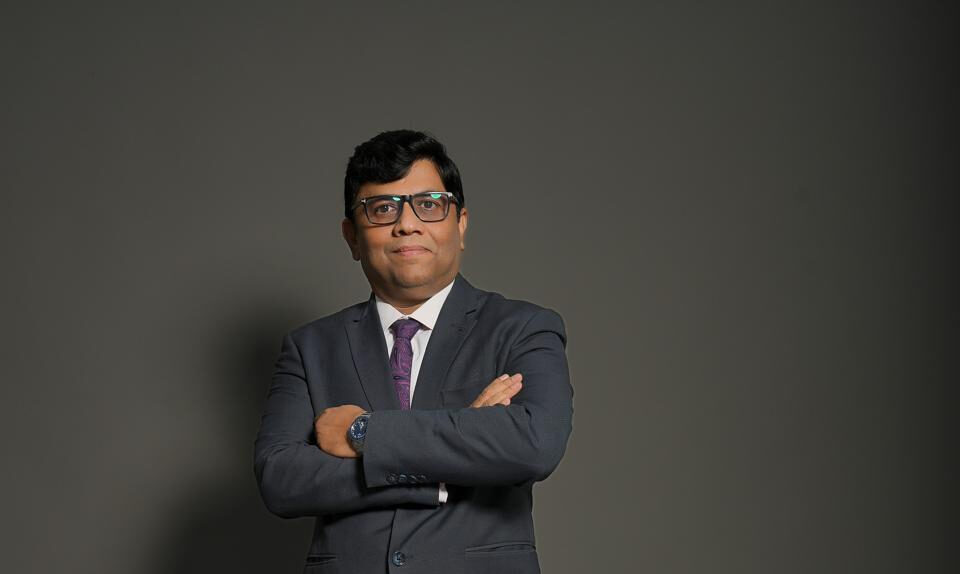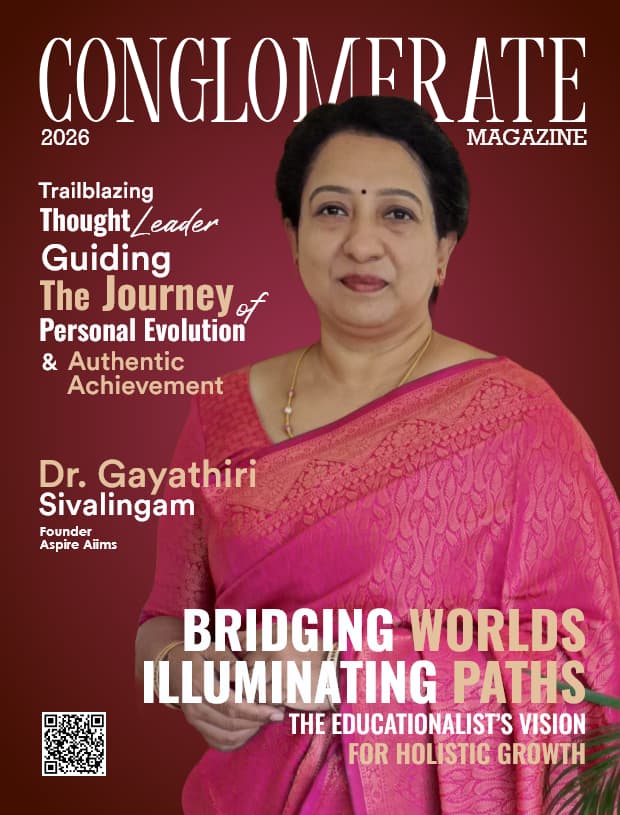In the sprawling landscape of global retail transformation, where countless leaders chase quarterly numbers and market share, one man’s journey stands as a testament to what happens when authentic hunger meets unwavering purpose. Devendra Kumar’s story begins not in the boardrooms of multinational corporations, but in the modest streets of Nellore, Andhra Pradesh, where a small-town boy learned that dreams could transcend circumstances.
Today, as retail markets across India and the GCC undergo seismic shifts, Devendra Kumar emerges as one of the most compelling voices in the industry. His transformation from a young man who couldn’t afford breakfast to a strategic advisor driving multi-million dollar turnarounds across continents represents more than personal success. It embodies the very essence of what modern retail leadership demands: authenticity, resilience, and an unshakeable commitment to empowering others.
“I’ve seen days when I couldn’t afford breakfast, yet I always carried the hunger to succeed,” Devendra reflects on his early years. This hunger, born from genuine necessity rather than manufactured ambition, would become the driving force behind a career that has redefined retail excellence across diverse markets and cultures.
The Foundation Years: Where Character Meets Opportunity
Growing up as the elder son in a large joint family in Nellore shaped more than just Devendra’s worldview; it forged the leadership principles that would later transform struggling businesses into profitable enterprises. The experience of making tough choices daily, of being resourceful when resources were scarce, and of understanding the weight of responsibility from an early age created a leader who would never lose touch with ground realities.
His journey into professional retail began at Hindustan Unilever, where he started as a Sales Incharge selling soaps and detergents. But even in this foundational role, his approach was distinctive. Rather than simply following prescribed processes, he brought an intuitive understanding of customer needs, developed through years of observing how families like his own made purchasing decisions.
The early win came when he broke sales records in Hyderabad, an achievement that provided more than professional recognition. “This early win gave me immense self-confidence and made me enjoy success as a professional,” he recalls. This moment marked the beginning of a pattern that would define his career: taking on challenges others might avoid, bringing fresh perspectives to established practices, and consistently delivering results that exceeded expectations.
His passion for badminton, where he represented his university in doubles, added another crucial dimension to his character. “Sports made me a gutsy fighter,” he notes, highlighting how competitive athletics taught him the importance of teamwork, strategic thinking under pressure, and the mental resilience required to bounce back from setbacks.
The Fmcg Foundation: Understanding Consumers At The Deepest Level
Devendra’s five-year journey through FMCG companies provided more than industry experience; it offered a masterclass in understanding consumer behavior across India’s diverse markets. Working with brands that touched millions of lives daily, he developed an appreciation for how products move from conception to consumption, and more importantly, how successful brands create emotional connections with their customers.
This FMCG foundation would prove invaluable when he transitioned to retail, bringing a unique perspective that many retail leaders lack. While others focused primarily on store operations or category management, Devendra understood the entire value chain. He knew how brands built consumer loyalty, how pricing strategies affected purchase decisions, and how product placement could influence shopping behavior.
“After five successful years in FMCG companies, retail excited me because it’s real, fast-paced, and impacts people’s lives daily,” he explains. This transition wasn’t driven by career advancement opportunities but by a genuine fascination with the human side of business. The energy of shop floors, the complexity of customer behavior, and the local nuances that determined success or failure in different markets all appealed to his naturally curious and people-focused leadership style.
The Spar Oman Turnaround: When Vision Meets Execution
If there was a defining moment in Devendra’s career, it was his appointment to lead the struggling SPAR Oman operation. The situation was dire: the retail division was deep in red, stakeholder confidence was eroding, and some leaders had effectively given up. For many executives, such an assignment would represent career risk. For Devendra, it represented opportunity.
The turnaround began with Khimji Mart and gained momentum after securing the SPAR franchise, but the real transformation lay in Devendra’s systematic approach to retail excellence. Rather than implementing quick fixes, he focused on building sustainable foundations: restructuring product offerings based on deep customer insights, revamping the entire store experience to create emotional connections with shoppers, re-energizing teams through empowerment and clear purpose, and adding complementary businesses to create a comprehensive retail ecosystem.
The results spoke volumes: profitability achieved in just 26 months, but more importantly, a completely transformed organizational culture that could sustain success long-term. “The success proved that with vision, commitment, and the right team, even the bleakest situations can be transformed,” Devendra reflects on this pivotal achievement.
This turnaround established Devendra’s reputation as more than just a retail operator; he became known as a transformation specialist who could diagnose complex organizational challenges and implement solutions that addressed root causes rather than symptoms.
The 6P Model: Strategic Framework For Diverse Markets
Central to Devendra’s success across different geographies has been his development and application of the 6P Retail Model: Product, Place, Price, Promotion, People, and Process. But what sets his approach apart is not the framework itself, but his sophisticated understanding of how these elements must be calibrated differently across markets while maintaining strategic coherence.
In India, his emphasis falls heavily on local sourcing strategies that respect regional preferences, price-value equations that acknowledge diverse economic realities, and promotions that resonate with cultural contexts. The modern Kirana model that he champions thrives because Product and Price strategies are deeply rooted in local preferences, while store-level agility defines the Process dimension.
His experience in the GCC revealed different market dynamics requiring different strategic emphasis. Where customer expectations are higher and competition is premium-led, his focus shifts to assortment excellence that anticipates customer needs, operational consistency that builds trust, people productivity that enables superior service, and experience-driven Promotion that creates memorable shopping journeys.
“The 6Ps don’t just help in planning, they guide daily operations, audits, and reviews,” Devendra explains. This operational integration of strategic frameworks represents a sophisticated approach to retail management that bridges the often problematic gap between strategy formulation and execution excellence.
People-First Leadership: The Servant Leadership Philosophy
Devendra’s leadership philosophy has been profoundly influenced by his exposure to servant leadership concepts during his time at Walmart India. This approach, which positions leaders as enablers of their teams’ success rather than traditional command-and-control figures, aligns perfectly with his natural inclinations developed during his formative years in Nellore.
“Teams drive transformation when they feel ownership and trust,” he emphasizes, reflecting a leadership style that treats empowerment as strategy rather than tactics. His approach to People within the 6P model goes far beyond human resource management; it encompasses creating environments where individuals can realize their potential while contributing to collective success.
This philosophy has proven particularly effective in retail environments where frontline employees directly impact customer experiences. By treating team members as partners in success rather than simply implementers of policies, Devendra has consistently created cultures where innovation emerges organically from those closest to customers.
His commitment to developing others extends beyond immediate business needs. “My life purpose is to enlighten young, bright minds to realize their peak potential and help MSMEs evolve into great professional companies,” he states, revealing an ambition that transcends personal achievement to focus on systemic impact.
Innovation Through Simplicity: Meaningful Change Over Technological Sophistication
In an industry often obsessed with technological innovation, Devendra brings a refreshingly grounded perspective on what drives meaningful change. His approach to innovation focuses on understanding customer needs deeply and finding elegant solutions that may not always involve sophisticated technology but consistently deliver superior value.
“I believe innovation is not always about big tech, it’s often about simple, meaningful changes,” he explains. This philosophy has led to innovations that others might overlook: listening systems that capture insights from customers and frontline teams, benchmarking approaches that adapt global best practices to local contexts, and data utilization strategies that inform decision-making without overwhelming operational complexity.
His connection with SPAR Global initiatives has provided access to proven innovations from international markets, but his approach to adoption reflects sophisticated judgment about what will work in specific local contexts. Rather than implementing international best practices wholesale, he adapts core principles to align with local market dynamics and organizational capabilities.
P&L Mastery: Where Strategy Meets Financial Discipline
Leading multi-country P&L operations has taught Devendra that sustainable profitability requires more than cost management or revenue optimization; it demands a comprehensive understanding of how all business elements interact to create value. His approach begins with identifying current gaps and quick-win opportunities while simultaneously building systems for long-term sustainable performance.
His strategies encompass granular focus on unit economics through detailed tracking of productivity, shrinkage, and SKU-level profitability; commercial negotiations and direct sourcing initiatives that create sustainable cost advantages; private label development that protects margins while building customer loyalty; category-specific margin engineering that recognizes the different dynamics of fresh products, FMCG, and general merchandise; and accountability systems that empower local leadership while maintaining strategic alignment.
“Sustainable growth isn’t an outcome, it’s a mindset,” Devendra observes. “When data, discipline, and team alignment come together, profitability becomes a habit, not a hope.” This perspective reflects his understanding that financial success in retail requires cultural transformation as much as operational excellence.
Executive Education: Investing In Continuous Transformation
Devendra’s commitment to executive education through programs at IIM and Ivy League institutions represents more than personal development; it reflects his belief that leaders must continuously evolve to remain effective in rapidly changing markets. These educational experiences provided him with strategic frameworks and global perspectives that enhanced his natural instincts and practical experience.
The combination of street-smart retail intuition developed through years of frontline experience with sophisticated strategic thinking gained through formal education creates a leader capable of operating effectively at multiple levels. He can engage with customers on shop floors with authentic understanding while participating in boardroom discussions with strategic sophistication.
This educational investment also reflects his broader philosophy about learning. “Stay curious, keep learning,” he advocates, recognizing that in an industry as dynamic as retail, continuous learning isn’t optional but essential for sustained relevance.
Building The Fresh2Day Legacy: Local Connection At Scale
His leadership of Fresh2Day, which grew to 30 stores in Chennai, demonstrated Devendra’s ability to build retail concepts from the ground up while maintaining focus on core values. The emphasis on fresh produce, customer loyalty, and local connections reflected his understanding that successful retail must serve genuine community needs rather than simply occupying market space.
This venture showcased his ability to scale operations while preserving the authentic relationships that drive customer loyalty. Rather than sacrificing personal connection for operational efficiency, he created systems that enabled authentic engagement at scale.
Vision For Retail Transformation: The Modern Kirana Revolution
Devendra’s perspective on the future of retail in India centers on what he calls the “Modern Kirana revolution,” a concept that bridges traditional neighborhood store intimacy with contemporary retail sophistication. His vision recognizes that modern retail still contributes only around 9% of India’s overall market, representing enormous growth opportunity for leaders who can navigate this transformation thoughtfully.
“Retail in India will evolve into a Phygital ecosystem, blending physical experience with digital convenience,” he predicts. His planned co-founding of a Modern Kirana Format represents the practical application of these insights: a low-cost, omni-channel retail model designed to empower communities while redefining grocery retail.
For the GCC markets, his vision emphasizes value-driven and fresh-focused formats where customer loyalty will increasingly align with retailers who can deliver personalized experiences through strategic use of data and insights. The focus on private labels, convenience-led formats, and personalization represents his understanding of how affluent markets will evolve.
The Legacy Vision: Transformation Beyond Profit
When asked about the legacy he aims to create, Devendra’s response reveals ambitions that extend far beyond business success. “I want to be remembered as someone who transformed teams, businesses, and lives, a leader who created impact beyond profit,” he states, articulating a vision of leadership that measures success through the growth and empowerment of others.
His desire to be “a living example that you don’t need privilege to reach the top, just vision, values, and velocity” speaks to his understanding of his role as inspiration for others who may face similar circumstances to his own early challenges. This perspective transforms his personal success into a platform for broader social impact.
A Message For The Next Generation
Devendra’s advice to young leaders reflects the hard-won wisdom of someone who has navigated multiple industry transformations while maintaining authentic connection to his values. “Stay grounded, even as you dream big,” he counsels, recognizing the importance of ambition balanced with humility.
His emphasis on being “a student for life” acknowledges that in rapidly evolving industries, learning agility often matters more than current expertise. The advice to chase impact rather than designations reflects his understanding that meaningful career satisfaction comes from creating value rather than accumulating titles.
“Tough times are teachers, embrace them,” he advises, speaking from experience of transforming challenging situations into growth opportunities. This perspective, developed through his own journey from financial struggle to business success, offers authentic guidance for others facing their own obstacles.
The Road Ahead: Continuing The Transformation Journey
As retail markets across India and the GCC continue evolving, leaders like Devendra Kumar provide essential guidance on navigating change while maintaining human-centered values. His approach demonstrates that transformation need not sacrifice authenticity, that global sophistication can coexist with local relevance, and that business success can serve broader social purposes.
His personal mantra, “Be Hungry, Stay Humble,” encapsulates the balance required for sustained leadership effectiveness: the ambition to continuously improve combined with the self-awareness to remain connected to fundamental values and the people who make success possible.
“Let your journey be your message,” he concludes, offering perhaps the most profound insight of all. In an era where leadership can sometimes feel disconnected from authentic experience, Devendra Kumar represents the power of leaders whose success stories remain grounded in genuine struggle, real transformation, and unwavering commitment to lifting others along the way.
As he prepares for his next chapter, co-founding a Modern Kirana Format that could redefine Indian grocery retail, Devendra Kumar continues embodying the principle that the most meaningful success comes not from reaching the top, but from using that position to create opportunities for others to rise as well.







